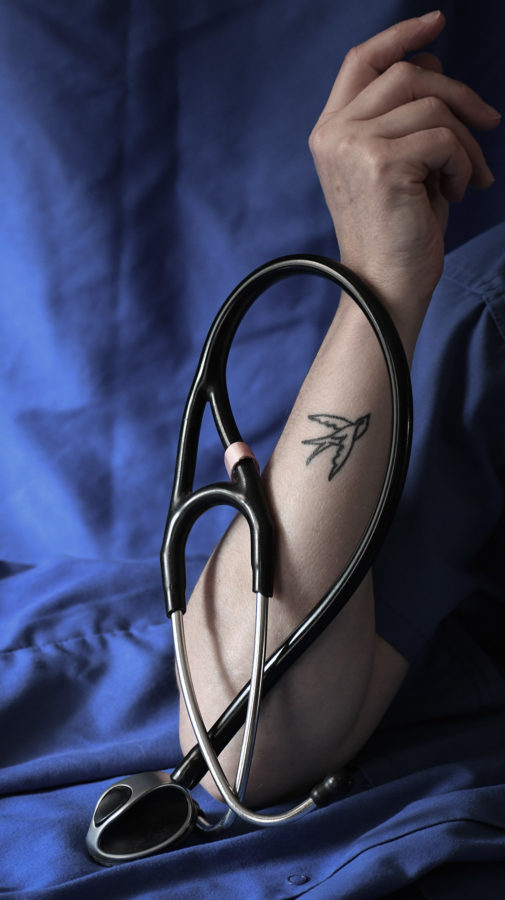As Hattiesburg’s tattooing industry grows around the University of Southern Mississippi, students have more access than ever to tattoos. But how will industries with traditionally negative views of tattoos, such as Nursing, respond to the influx of tattooed workers when Southern Miss’s students begin joining the workforce?
Brandi Bruce works for Lady Luck Tattoo and has been a tattoo artist for 13 years. She has worked both in and out of Hattiesburg for around ten years. Bruce believes the tattoo industry is definitely “booming” around Hattiesburg.
“To have so many tattoo shops in this area, especially close to the university, […] it can be overwhelming sometimes, and I’m pretty sure college students feel that,” Bruce said.
Bruce also said Lady Luck Tattoo’s clientele is primarily college students, estimating that between 80 and 85 percent of clients are USM students.
These clients include many nurses and nursing students, and Bruce acknowledges the stigmas against tattoos that exist within healthcare professions.
“I’ve been tattooing for 13 years,” Bruce said, “and watching it evolve over the past 13 years, it’s definitely gotten better. But again, you know, we live in this world where we’ve got privately-owned hospitals, state run hospitals, federally run hospitals and everything, right? Of course they’re going to have more regulations.”
With the popularity of tattoos increasing and college students flooding many tattoo shops across Hattiesburg, one must question whether the stigmas associated with tattoos will affect tattooed students’ perceived professionalism as they leave USM and search for jobs, especially in the healthcare field.
Rusty Anderson, the Director of Career Services at Southern Miss, assists students and alumni as they choose their majors, hone their interview skills and prepare resumes and cover letters. Anderson believes professionalism is important for students and alumni as they interview for jobs, but that it is not impacted by body modifications, like tattoos, to the same degree as it once was.
“It’s going to vary from employer to employer,” Anderson said. “Some employers don’t have any objections to tattoos as long as they’re covered in the work environment. Other employers couldn’t care less.”
Anderson believes a lot of healthcare professions fall into the later category.
“In the healthcare field, I think it’s probably more of a trend to have tattoos that aren’t visible, but they’re not going to not hire somebody because of a tattoo in the interview,” said Anderson. “They might ask that it be covered in some cases.”
While Anderson said the issue of maintaining professionalism while getting tattoos is not brought up by students at Career Services, some students with visible tattoos receive coaching on how to approach job interviews and openly discuss their body art with employers. Career Service’s website also offers students numerous diagrams and images of appropriate dress codes for different interviews and events, but they do not include information on acceptable workplace tattoos.
Some healthcare facilities in Hattiesburg have dress codes that tend to approach visible tattoos with a conservative attitude, however. Forrest General Hospital’s dress code policy explicitly says, “Any tattoos, whether temporary or permanent, must not be visible.”
Lynn Welford has been a registered nurse for nearly 25 years, and she has worked in Alabama, Mississippi and Texas. Welford suggests that regional differences contribute to the social stigmas surrounding tattoos in the medical field.
“Mississippi, I believe, is just very conservative when it comes to tattooing and piercings,” said Welford.
While Welford’s workplace, Southern Bone and Joint Associates, P.A., does have a dress code policy prohibiting visible tattoos, the rule is rarely observed. Welford said numerous nurses at the clinic have visible tattoos.
“It’s hard to find someone who doesn’t have a tattoo nowadays. People without tattoos are becoming the exception,” Welford said with a laugh.
While some clinics might approach tattoo policies with a lenient attitude, Welford also noted that Forrest General Hospital’s tattoo policy is strictly observed. She knows nurses have been sent home from the hospital for wearing clothes that revealed their tattoos.
Welford believes the strict dress codes within the medical field are primarily due to the wide variety of patients healthcare workers treat.
“Something we have to take into consideration as healthcare professionals is that we’re taking care right now of a generation of people where those things were not accepted,” Welford said. “A lot of older people still have those negative feelings about tattoos and piercings.”
Welford hopes that dress code policies in the healthcare industry will be revised as new nurses enter leadership positions within hospitals and clinics.
“I honestly think that those rules are enforced because their dress codes have not been updated,” said Welford.
Welford herself has a small sparrow tattoo on her wrist. She said the tattoo helps her connect with her patients, who frequently ask about it while she checks their vital signs.
“It opens up dialogue that’s not just about healthcare,” Welford said. “As a healthcare professional, you [realize people] become more personable when they see you have a tattoo.”
Welford’s tattoo was done at Hattiesburg Tattoo by Tyler Davis, who works with nurses and nursing students to find appropriate tattoo placings for their field and comfort.
“If, for instance, you couldn’t have a tattoo beneath the elbow, couldn’t have anything on your forearms, wrists or anything like that, we would just figure out where you can have it and go from there and choose the spot that you like the most,” said Davis.
Davis also had some advice for nursing students curious about getting tattoos.
“If you’re concerned about your career and perceived professionalism, do not get tattooed on your hands, neck or face, no matter what it is,” Davis said. “Avoid those spots completely.”
Bruce also agrees that hand, neck and face tattoos are considered “unprofessional” for healthcare workers, and are generally seen as pretty hardcore.
“Don’t get a tattoo that’s harder than you,” Bruce said.






























